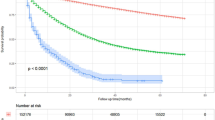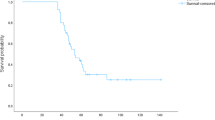Abstract
This study aims to explore patterns of practice of tumor marker analyses and potential prognostic impact of abnormal markers in patients with brain metastases from solid tumors. Previously, lactate dehydrogenase (LDH) and albumin were identified as relevant biomarkers. We performed a retrospective analysis of 120 patients with known LDH and albumin treated with whole-brain radiotherapy (WBRT) in two different situations: (1) brain metastases detected at initial cancer diagnosis (n = 46) and (2) brain metastases at later time points (n = 74, median interval 13 months). Twenty-six patients (57 %) from group 1 had at least one tumor marker analyzed, and 11 patients (24 %) had abnormal results. Twenty-two patients (30 %) from group 2 had at least one tumor marker analyzed, and 16 patients (22 %) had abnormal results. When assuming that LDH and albumin would be standard tests before WBRT, additional potential biomarkers were found in 36 % of patients with normal LDH and albumin. Marker positivity rates were for example 80 % for carcinoembryonic antigen (CEA) in colorectal cancer and 79 % for CA 15-3 in breast cancer. Abnormal markers were associated with presence of liver metastases. CA 15-3 values above median predicted shorter survival in patients with breast cancer (median 1.9 vs. 13.8 months, p = 0.1). Comparable trends were not observed for various markers in other tumor types. In conclusion, only a minority of patients had undergone tumor marker analyses. Final group sizes were too small to perform multivariate analyses or draw definitive conclusions. We hypothesize that CA 15-3 could be a promising biomarker that should be studied further.

Similar content being viewed by others
Abbreviations
- CA:
-
Cancer antigen
- CEA:
-
Carcinoembryonic antigen
- CT:
-
Computed tomography
- DS-GPA:
-
Diagnosis-specific graded prognostic assessment score
- Gy:
-
Gray
- LDH:
-
Serum lactate dehydrogenase
- MRI:
-
Magnetic resonance imaging
- NSCLC:
-
Non-small cell lung cancer
- NSE:
-
Serum neuron-specific enolase
- PSA:
-
Prostate-specific antigen
- WBRT:
-
Whole-brain radiotherapy
References
Lorenzoni J, Devriendt D, Massager N, et al. Radiosurgery for treatment of brain metastases: estimation of patient eligibility using three stratification systems. Int J Radiat Oncol Biol Phys. 2004;60:218–24.
Nieder C, Mehta MP. Prognostic indices for brain metastases—usefulness and challenges. Radiat Oncol. 2009;4:10.
Sperduto PW, Berkey B, Gaspar LE, Mehta M, Curran W. A new prognostic index and comparison to three other indices for patients with brain metastases: an analysis of 1,960 patients in the RTOG database. Int J Radiat Oncol Biol Phys. 2008;70:510–4.
Zindler JD, Rodrigues G, Haasbeek CJ, et al. The clinical utility of prognostic scoring systems in patients with brain metastases treated with radiosurgery. Radiother Oncol. 2013;106:370–4.
Sperduto PW, Chao ST, Sneed PK, et al. Diagnosis-specific prognostic factors, indexes, and treatment outcomes for patients with newly diagnosed brain metastases: a multi-institutional analysis of 4,259 patients. Int J Radiat Oncol Biol Phys. 2010;77:655–61.
Sperduto PW, Kased N, Roberge D, et al. Summary report on the graded prognostic assessment: an accurate and facile diagnosis-specific tool to estimate survival for patients with brain metastases. J Clin Oncol. 2012;30:419–25.
Nieder C, Marienhagen K, Dalhaug A, et al. Prognostic models predicting survival of patients with brain metastases: integration of lactate dehydrogenase, albumin and extracranial organ involvement. Clin Oncol (R Coll Radiol). 2014;26:447–52.
Ji Z, Bi N, Wang J, et al. Risk factors for brain metastases in locally advanced non-small cell lung cancer with definitive chest radiation. Int J Radiat Oncol Biol Phys. 2014;89:330–7.
Horinouchi H, Sekine I, Sumi M, et al. Brain metastases after definitive concurrent chemoradiotherapy in patients with stage III lung adenocarcinoma: carcinoembryonic antigen as a potential predictive factor. Cancer Sci. 2012;103:756–9.
Lee DS, Kim YS, Jung SL, et al. The relevance of serum carcinoembryonic antigen as an indicator of brain metastasis detection in advanced non-small cell lung cancer. Tumour Biol. 2012;33:1065–73.
Arrieta O, Saavedra-Perez D, Kuri R, et al. Brain metastasis development and poor survival associated with carcinoembryonic antigen (CEA) level in advanced non-small cell lung cancer: a prospective analysis. BMC Cancer. 2009;9:119.
Di Gioia D, Heinemann V, Nagel D, et al. Kinetics of CEA and CA15-3 correlate with treatment response in patients undergoing chemotherapy for metastatic breast cancer (MBC). Tumour Biol. 2011;32:777–85.
Antoni D, Clavier JB, Pop M, et al. Institutional, retrospective analysis of 777 patients with brain metastases: treatment outcomes and diagnosis-specific prognostic factors. Int J Radiat Oncol Biol Phys. 2013;86:630–7.
Nieder C, Pawinski A, Molls M. Prediction of short survival in patients with brain metastases based on three different scores: a role for ‘triple-negative’ status? Clin Oncol (R Coll Radiol). 2010;22:65–9.
Gaspar L, Scott C, Rotman M, et al. Recursive partitioning analysis (RPA) of prognostic factors in three Radiation Therapy Oncology Group (RTOG) brain metastases trials. Int J Radiat Oncol Biol Phys. 1997;37:745–51.
Lagerwaard FJ, Levendag PC, Nowak PJ, et al. Identification of prognostic factors in patients with brain metastases: a review of 1292 patients. Int J Radiat Oncol Biol Phys. 1999;43:795–803.
Rades D, Dunst J, Schild SE. A new scoring system to predicting the survival of patients treated with whole-brain radiotherapy for brain metastases. Strahlenther Onkol. 2008;184:251–5.
Rades D, Dziggel L, Nagy V, et al. A new survival score for patients with brain metastases who received whole-brain radiotherapy (WBRT) alone. Radiother Oncol. 2013;108:123–7.
Molina R, Bosch X, Auge JM, et al. Utility of serum tumor markers as an aid in the differential diagnosis of patients with clinical suspicion of cancer and in patients with cancer of unknown primary site. Tumour Biol. 2012;33:463–74.
Jacot W, Quantin X, Boher JM, et al. Association d’Enseignement et de recherche des internes en oncologie. Brain metastases at the time of presentation of non-small cell lung cancer: a multi-centric AERIO analysis of prognostic factors. Br J Cancer. 2001;84:903–9.
Kanou T, Okami J, Tokunaga T, et al. Prognosis associated with surgery for non-small cell lung cancer and synchronous brain metastasis. Surg Today. 2014;44:1321–7.
Noura S, Ohue M, Shingai T, et al. Brain metastasis from colorectal cancer: prognostic factors and survival. J Surg Oncol. 2012;106:144–8.
Kye BH, Kim HJ, Kang WK, et al. Brain metastases from colorectal cancer: the role of surgical resection in selected patients. Colorectal Dis. 2012;14:e378–85.
Conflicts of interest
None
Author information
Authors and Affiliations
Corresponding author
Additional information
Carsten Nieder holds a MD degree, Nordland Hospital and University of Tromsø
Astrid Dalhaug holds a MD degree, Nordland Hospital and University of Tromsø
Ellinor Haukland holds a MD degree, Nordland Hospital
Bård Mannsåker holds a MD degree, Nordland Hospital
Adam Pawinski holds a MD degree, Nordland Hospital
Rights and permissions
About this article
Cite this article
Nieder, C., Dalhaug, A., Haukland, E. et al. Tumor marker analyses in patients with brain metastases: patterns of practice and implications for survival prediction research. Tumor Biol. 36, 6471–6476 (2015). https://doi.org/10.1007/s13277-015-3337-y
Received:
Accepted:
Published:
Issue Date:
DOI: https://doi.org/10.1007/s13277-015-3337-y




